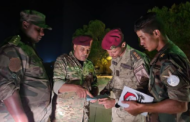Jun. 1, kidnapped Jumhouria Bank manager Ali Garza found dead on Tripoli seashore.
Jun. 6, US Embassy calls for release of Red Crescent head Mansour Atti Al-Magribi, kidnapped in Ajdabia Jun. 4.
Jun. 6, 2 detectives killed, 2 injured in car bomb blast in Sabha. IS has claimed responsibility.
TRIPOLI
- Jun. 1, the manager of the Jumhouria Bank, Ali Garza was found lying dead on the seashore in Tripoli, after gunmen kidnapped him last week. The body of Garza was found riddled with bullets, witnesses said. Garza is a resident of the city of Nesma. He moved to Tripoli and settled in the Sidi Sleem neighbourhood, after assuming the position of Jumhouria Bank Manager;

AJDABIA
- Jun. 6, the United States (US) Embassy in Libya called for release of the Head of the Libyan Red Crescent, Mansour Atti Al-Magribi, who was kidnapped in Ajdabia on Friday, Jun. 4. UNSMIL, too, expressed concern about the safety and security of Al-Maghrbi, who was also a civil society activist;

MISRATA
- The Libyan Customs Authority announced the seizure of a container, with large quantities of highly concentrated tramadol pills, at the Misrata Port Customs Center. The pills were hidden inside a 20-foot container coming from Lebanon, which contained medicines that are allowed to be handled, but tramadol pills were added alongside them”;
SABHA
- Jun. 6, two criminal investigation apparatus officers were killed and four others were injured in a car bomb explosion that targeted a checkpoint in the Al-Maziq crossroad, northern Sabha, in south Libya, Libya Alahrar TV correspondent has confirmed. The US Embassy in Libya strongly condemned the attack on a security checkpoint in Sabha, saying it is an attempt to undermine stability and unity in Libya. The Islamic State later claimed responsibility for the attack;

TAWERGHA
- Jun. 2, Salem Al-Saghir, Member of the Tawergha Municipal Council confirmed that the municipal council issued 13 urgent recommendations to the Government of National Unity (GNU), regarding the issue of Internally Displaced People (IDP’s)in the country. In statements to Al-Ain newspaper, Al-Saghir said: “The Municipal Council raised 9 problems facing IDP’s upon their return to the city, including security, destroyed houses, the spread of diseases in the city such as leishmaniasis and bilharzia, and the lack of electricity poles to supply homes with service.”;
TOBRUK
- Jun. 2, the Libyan National Army’s (LNA) 104 Battalion of the Tobruk Military District, thwarted a gold smuggling attempt, worth one million dinars, at the Ain Al-Ghazaleh gate, where the battalion is stationed. According to the 104 Battalion’s media office, a white vehicle was stopped with two individuals. During the inspection, 4 boxes filled with gold were found, alongside two automatic hunting rifles, and two pistols which were also seized by the LNA;

INTERNAL AFFAIRS
- Jun. 6, the Director of the Moral Guidance Department of the Libyan National Army (LNA), Brigadier General Khalid al-Mahjoub, stressed that the unification of the military institution does not mean an acceptance of, or leniency towards the integration of terrorist or criminal elements into it. Al-Mahjoub said that the military parade, held recently in Benghazi, confirms that the armed forces will not stop building their capabilities to be able to perform their tasks in preserving Libya’s sovereignty, security and stability;

- Jun. 3, Libyan Parliament Speaker, Ageela Saleh arrived in Morocco for a meeting with the head of the High Council of State (HCS), Khaled Al-Mishri to discuss the names of candidates for the country’s sovereign positions. In a press statement upon his arrival in Rabat, Saleh said, “we are against the interference of any foreign countries in Libya, and thus we demand the departure of all forces and mercenaries from our country.”;
- Jun. 3, Greek Foreign Minister, Nikos Dendias expressed his displeasure at the German choice to not invite Greece to the second Berlin Conference on Libya. Speaking at the Second International Conference of Cultural Heritage, Dendias stressed that the priority of the summit must be the immediate departure of all foreign forces and mercenaries from Libya. “Greece has a direct route of communication with Libya. Despite this, we are extremely disappointed that Germany, obsessively sticking to its strategy, did not invite us yet again to the Libya summit,” according to a statement released by Dendias on Twitter;

- On Tuesday, Chief of the Criminal Investigation Department (CID), Brigadier General Mahmoud Ashour, stressed the necessity of enacting laws and regulations to deter virtual crimes and limit their spread in society. This came during a speech delivered by Ashour at the opening of the workshop organised by CID, under the title “Virtual Crime Legislation in Libya between Reality and Ambition,” on the occasion of the National Information Technology Day. Ashour emphasised that virtual crimes have become more dangerous, and threatened society as a whole, and called for the issuance of legislation aimed at reducing virtual crimes;

INTERNATIONAL RELATIONS
- The Congolese President, Denis Sassou Nguesso, expressed his dissatisfaction with the persistent attempts to marginalize the role of the African Union (AU) in resolving the Libyan file, as well as the noticeable lack of coordination with the international community. In his speech during the meeting of the leaders of the Economic Community of Central African States (ECCAS) in the capital, Brazzaville, Nguesso said that there is a failure of the international community regarding the continuous calls “for a permanent solution to the Libyan crisis.” He noted that the Libyan crisis has multiple effects that led to the destabilization of all Sahel countries;

- Jun. 6, a Libyan delegation visited Russia and discussed the reconstruction file with the Russian Deputy Foreign Minister, Mikhail Bogdanov. During the delegation’s participation in the St. Petersburg International Economic Forum (SPIEF), talks focused on a number of economic and investment issues and Moscow’s contribution to the reconstruction efforts in Libya. According to the Media Office of the Libyan Ministry of Finance, a meeting was held with the Executive Vice President at African Export-Import Bank, Amr Kamel, and his accompanying team about the possibility of Libya joining and contributing to this bank;
- Jun. 5, Sheikh Abdullah bin Zayed Al Nahyan, the UAE’s Minister of Foreign Affairs and International Cooperation expressed his country’s support for all sincere efforts that lead to a secure, stable and prosperous Libya. During the meeting, which was held at headquarters of the UAE Ministry of Foreign Affairs in Abu Dhabi, bin Zayed, with his Libyan Counterpart Najla Al-Mangoush, discussed the well-established brotherly relations between the UAE and Libya and ways to strengthen and develop them;
- Jun. 5, Italian Defence Minister, Lorenzo Guerini, said that Operation IRINI should focus more on training the Libyan Coast Guard, according to the Italian news agency Nova. The Italian Minister said that he “believes the most important European mission in monitoring the arms embargo to Libya should focus more on training the Libyan Coast Guard.” He added that “there must be a European commitment in this direction, and as a consequence Italy should consider dealing with the large dynamics related to migration.”;
- Jun. 4, Germany has invited Morocco to participate in the upcoming International Conference on Libya, which will be held on 23 June in Berlin, according to the Morocco Telegraph newspaper. It added that the invitation has been sent, and Morocco’s response has not yet been announced. The newspaper noted that the German invitation did not take into consideration the deterioration in relations between the two countries, over the past several weeks;
- Jun. 2, Egyptian President, Abdel-Fatah El-Sisi and European Council President, Charles Michel stressed the importance of bilateral coordination to support the current transitional phase in Libya. The Egyptian Presidency said in a statement that El-Sisi and Michel exchanged developments on the political and security situation in Libya, during a telephone call;
- Jun. 2, Head of the United Nations Support Mission in Libya (UNSMIL), Jan Kubis welcomed the participation of Libyan Foreign Minister, Najla Al-Mangoush and Head of the Switzerland’s Federal Department of Foreign Affairs, Ignazio Cassis, at the Senior Officials Meeting of the International Follow-up Committee on Libya;
- Jun. 1, Libyan Prime Minister Abdel-Hamid Dbaiba met with French President, Emmanuel Macron in Paris for bilateral talks. They focused on providing support for the political transition and ensuring the stability of the North African country. “We must put an end to all foreign interference, as well as ensure the withdrawal of all foreign mercenaries’ from Libyan soil: the Turkish, the Syrian mercenaries, and all the others,” Macron said in a joint press conference with Dbaiba;
- May 31, Georgette Gagnon, Assistant Secretary-General, and UN Resident and Humanitarian Coordinator for Libya, confirmed that the United Nations stressed that the national reconciliation process should be led by Libyans, and in a participatory and rights-based manner, according to a statement by the United Nations Support Mission in Libya (UNSMIL);

- May 31, Libyan Foreign Minister, Najla Al-Mangoush met with her Italian counterpart, Luigi Di Maio on the sidelines of the Italian-Libyan Business Forum in Rome. The Italian Foreign Ministry said in a statement that Di Maio renewed Italy’s commitment towards achieving lasting stability in Libya. “Di Maio highlighted the importance of preparing for the elections scheduled to take place on 24 December 2021, and affirmed the need to reach a constitutional base for Libya’s elections and adopt the electoral law,” the statement added.
- May 31, Tunisian President, Kais Saied bid farewell to the Head of Libya’s Presidential Council, Mohamed Al-Mnifi, after a three-day visit to Tunisia to discuss regional issues and bilateral cooperation. During the visit, Al-Mnifi expressed his appreciation for Tunisia’s supportive role, adding that he discussed a number of issues of common interest between the two countries.



























